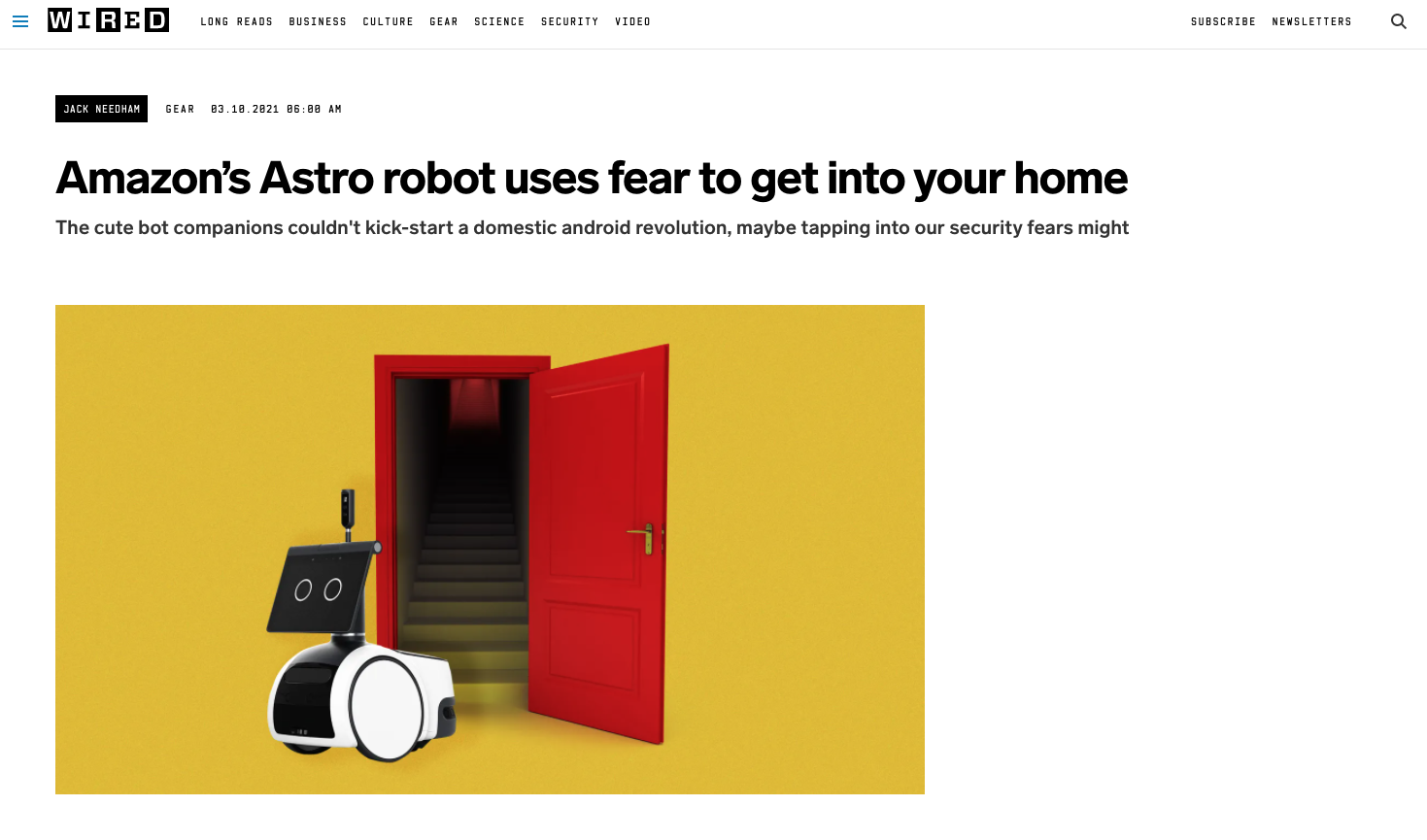Kate Devlin at the Department of Digital Humanities was recently interviewed for a piece in Wired on how “Amazon’s Astro robot uses fear to get into your home”. You can read the article here, and below is the transcript of the interview that Kate did with Jack Needham…
From what you have seen so far, what’s different about an Amazon robot to other home robot products that have been on the market for a while? I imagine the sheer monster that is Amazon brings some huge differences.
A lot of the robots we have in our homes aren’t robots like this. Most common are robot vacuum cleaners, for example. The Astro robot aims to provide more broad service (such as video calls on wheels – essentially a telepresence robot) and also some scope to deliver small objects from one room to another.
Yes, Amazon has a lot of market power, but will people be happy to fork out for essentially a screen on wheels?
These things are billed as being a convenience – something that switches on lights, makes video calls etc. But it’s still a product that’s designed to make money and gather data. Do you think the everyday person forgets that? Why?
There’s a tendency to overlook or disregard privacy if it’s a barrier to convenience. We’re pretty much all guilty of that. How many of us read through pages of terms and conditions to use an app or service that we need? But in some instances, consumers may not be aware of just how much data is being gathered about them, or what happens to their personal information.
Is there a growing paranoia that’s being tapped into that will probably help make this product successful? Maybe about home security, neighbour surveillance or anything else?
Considering the rise in monitoring technology such as smart doorbells, I could see how paranoia might fuel purchases. Ring doorbells made up made up eighteen per cent of Amazon’s total sales last year.
If so, why do you think we have that paranoia? And can a robot alleviate it?
I think the paranoia is being fed by consumerism and by our 24hr media diet. (Hmmm, does that make me sound paranoid?) We are living in a comparatively safe time – but an unsettling one, given what the world is going through. Scare stories are amplified on the news. People are naturally wary of others during a pandemic where they could get ill. It’s comforting to think that a piece of technology could provide peace of mind.
Can a robot alleviate that? It could certainly provide a veneer of comfort.
This sentinel guard dog that roams around the house has a camera and facial recognition, but it’s obviously not the only camera-fitted home surveillance product out there. Are the public increasingly becoming techno-snitches (I point to this Tweet you may have seen yesterday)? And if so, how do you think robots/gadgets are playing a part in that?
Yes. Techno-snitching is definitely a thing.
We are fortunate to live in a society where technology makes our lives better in many ways. That said, that same technology is also used to gather data about our every move. We are encouraged to weaponise that by sharing data with law enforcement, for example, or by naming and shaming online. Often that is done with little regard for the consequences because it’s seen as being ‘for the good of society’. Alas, the huge issue with bias in AI systems means that there are members of our society who face active discrimination from these same systems.
Amazon said that they were “humbled by the number of people who said Astro’s personality made it feel like a part of their family, and that they would miss the device in their home after it was gone.” Is there a conscious choice in making the robot cute? As if a little companion makes this technology and surveillance less scary? And through that, more likely to get into homes?
It’s absolutely a conscious choice in making robots cute. It’s a design feature that encourages us to engage with the robot in the same way that we might a pet. We humans are social creatures and we quickly respond socially to any technology that shows a positive semblance of animism. If it shows traits of cuteness then we’ll want to treat it kindly, even though we know it’s just a machine.
Finally, will you be buying one?
Not a chance! I don’t even switch on voice assistants.

